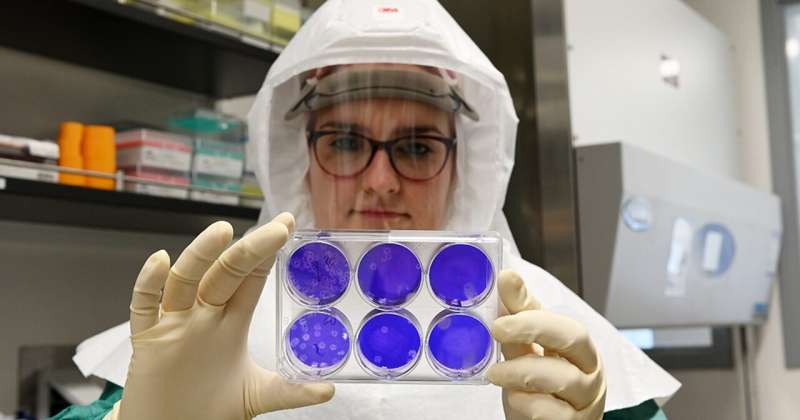This article has been reviewed according to Science X's editorial process and policies. Editors have highlighted the following attributes while ensuring the content's credibility:
fact-checked
peer-reviewed publication
trusted source
proofread
New study finds co-infection with 'superbug' bacteria increases SARS-CoV-2 replication

Global data shows nearly 10 percent of severe COVID-19 cases involve a secondary bacterial co-infection—with Staphylococcus aureus, also known as staph A, being the most common organism responsible for co-existing infections with SARS-CoV-2. Researchers at Western have found that the addition of a "superbug"—methicillin-resistant Staphylococcus aureus (MRSA)—into the mix could make the COVID-19 outcome even more deadly.
The mystery of how and why the combination of these two pathogens contributes to the severity of the disease remains unsolved. However, a team of Western researchers has made significant progress toward solving this "whodunit."
New research by Mariya Goncheva, Richard M. Gibson, Ainslie C. Shouldice, Jimmy D. Dikeakos and David E. Heinrichs has revealed that IsdA, a protein found in all strains of staph A, enhanced SARS-CoV-2 replication by 10- to 15-fold. The findings of this study are significant and could help inform the development of new therapeutic approaches for COVID-19 patients with bacterial co-infections.
Interestingly, the study, which was recently published in iScience, also showed that SARS-CoV-2 did not affect the bacteria's growth. This was contrary to what the researchers had initially expected.
"We started with an assumption that SARS-CoV-2 and hospitalization due to COVID-19 possibly caused patients to be more susceptible to bacterial infections which eventually resulted in worse outcomes," said Goncheva, who is a former postdoctoral associate, previously with the department of microbiology and immunology at Western University's Schulich School of Medicine & Dentistry.
Goncheva said bacterial infections are most commonly acquired in hospital settings and hospitalization increases the risk of co-infection. "Bacterial infections are one of the most significant complications of respiratory viral infections such as COVID-19 and Influenza A. Despite the use of antibiotics, 25 percent of patients co-infected with SARS-CoV-2 and bacteria, die as a result. This is especially true for patients who are hospitalized, and even more so for those in intensive care units. We were interested in finding why this happens," said Goncheva, lead investigator of the study.
Goncheva, currently Canada Research Chair in virology and professor of biochemistry and microbiology at the University of Victoria, studied the pathogenesis of multi-drug resistant bacteria (such as MRSA) supervised by Heinrichs, professor of microbiology and immunology at Schulich Medicine & Dentistry.
When the COVID-19 pandemic hit, she pivoted to study interactions between MRSA and SARS-CoV-2.
For this study conducted at Western's level 3 biocontainment lab, Imaging Pathogens for Knowledge Translation (ImPaKT), Goncheva's work created an out-of-organism laboratory model to study the interactions between SARS-CoV-2 and MRSA, a difficult-to-treat multi-drug resistant bacteria.
"At the beginning of the pandemic, the then-newly opened ImPaKT facility made it possible for us to study the interactions between live SARS-CoV-2 virus and MRSA. We were able to get these insights into molecular-level interactions due to the technology at ImPaKT," said Heinrichs, whose lab focuses on MRSA and finding drugs to treat MRSA infections. "The next step would be to replicate this study in relevant animal models."
More information: Mariya I. Goncheva et al, The Staphylococcus aureus protein IsdA increases SARS CoV-2 replication by modulating JAK-STAT signaling, iScience (2023). DOI: 10.1016/j.isci.2023.105975

















